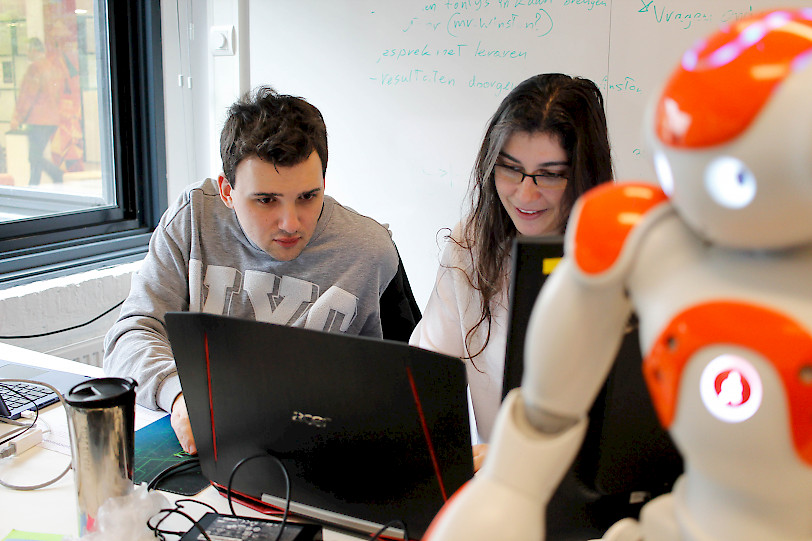Meeting the demand for trained AI engineers
 Within Fontys School of ICT, AI engineers have been trained for several years now. In addition to the software engineering programme, course material has been developed in machine learning, based on literature and practical experience with assignments from the field. After three years, Petra Heck (senior researcher) and Gerard Schouten (Lector AI & Big Data) record their findings in a paper entitled 'Lessons learned from educating AI engineers'. This paper was presented during the International Conference of Software Engineering.
Within Fontys School of ICT, AI engineers have been trained for several years now. In addition to the software engineering programme, course material has been developed in machine learning, based on literature and practical experience with assignments from the field. After three years, Petra Heck (senior researcher) and Gerard Schouten (Lector AI & Big Data) record their findings in a paper entitled 'Lessons learned from educating AI engineers'. This paper was presented during the International Conference of Software Engineering.
Artificial intelligence is one of the most important transformative technologies at this moment. Education in AI is therefore developing rapidly. With this publication, Heck and Schouten want to contribute to this process. They do this by providing an overview of the training structure and a number of concrete lessons.
Validation of institutional knowledge AI and ML
In the past three years, the specialisation in AI has been further refined on the basis of advancing insights. Students work on projects in which AI and Machine learning (ML) applications are investigated with business partners and researchers. This form of cooperation is also reflexive in nature: it tests and validates the knowledge of the field within the institute. Heck: "We have seen that our students can already solve problems from the field during their studies using ready-made machine learning models. The companies we work with are very enthusiastic and sometimes downright surprised by the results we achieve in the projects." Within the Fontys ICT InnovationLab, many of these work field projects are carried out, also over long periods of time by different groups of students. In this way, new developments become a continuous part of the education.
No AI without data
An AI application learns from data. This is the process of machine learning, where software learns to recognise patterns on the basis of large data sets, on which desired triggers are set up. A future AI engineer must therefore, by necessity, acquire knowledge of data and model engineering in order to set up this process, Heck says. This goes beyond the knowledge of software engineering they have gained in the first part of their studies: "The students must learn what is involved in training software on a given dataset to learn to recognise patterns. This is really different from programming the rules in the software themselves." So an AI engineer spends a lot of time on data engineering. Both the collection of data, storage and cleaning up require attention. Heck: "During the first semester of ICT & AI, students ask why they spend so much time on data. But we see that in the second semester, with this knowledge about the importance of data, they are suddenly much better equipped and immediately start to question the clients critically about the data they have supplied."
Data visualisation as a tool
In the role of AI engineer, cooperation and communication with experts is also important. Heck and Schouten conclude that students benefit greatly from knowledge of data visualisation. Heck: "It really is a specialism to make the results of your machine learning model clear to lay people, the clients in our projects. Fortunately, at Fontys University of Applied Sciences, we also have the ICT & Media Design programme, which covers subjects such as storytelling (with data) and interactive visualisations. We have integrated these into AI education." In addition to being a communication tool, these visualisations also help to keep data and model performance clear.
Who is the AI engineer of the future?
Heck and Schouten conclude that HBO students with software engineering skills and basic knowledge of machine learning are perfectly capable of developing software with machine learning components. The curriculum does not focus on the mathematical side of algorithms, so in practice collaboration with data scientists and MLOps experts is necessary for more complex AI systems. However, Heck expects that more and more algorithms and models will be unlocked for AI engineers with an applied hbo background: "The developments are going so fast. When I started my research two years ago, almost nothing was written about AI engineers and now there is the first workshop. In the business world, you usually hear the term MLOps when it comes to this. We at Fontys University of Applied Sciences ICT have been doing this for 3 years now and hardly have time to write down everything we learn. The great thing about our open educational model is that we can immediately pass on the latest developments to the students every semester."
Need for knowledge in AI
Petra Heck says that she is proud of the role that Fontys University of Applied Sciences has as a progressive educator of Applied AI engineers: "Our finding is that this programme is effective and teaches the skillset that future AI engineers need. We will continue to develop this programme for software engineers who want to advance or retrain, as the need for knowledge is great."
The paper 'Leassons Learned From Educating AI engineers' was presented at the 'First International Workshop on AI Engineering, part of the International Conference on Software Engineering on 31 May 2021. The full paper can be read here. Petra also writes accessible blogs on AI Engineering.